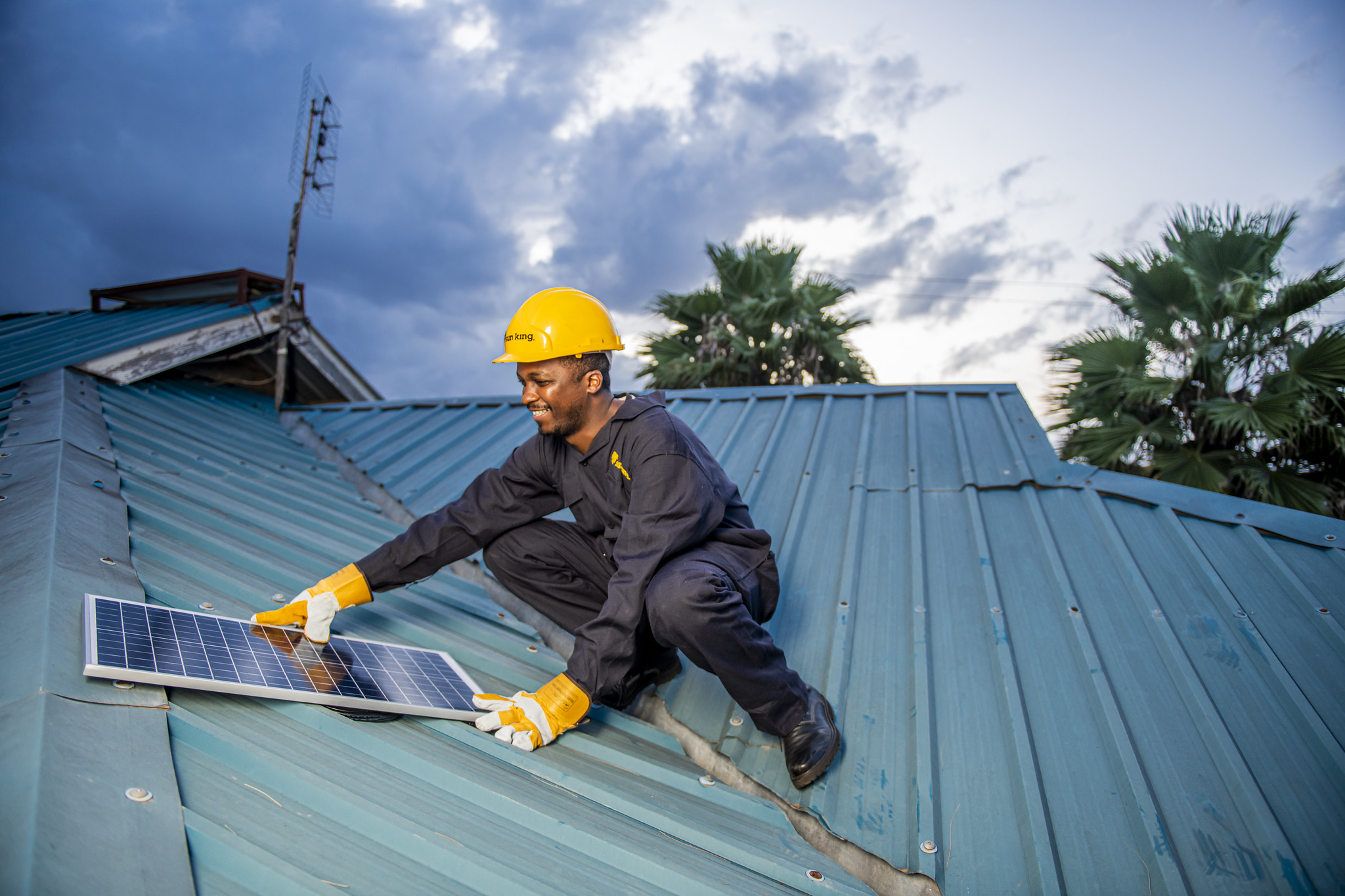Access to energy is a fundamental cornerstone for development in emerging economies, acting as a catalyst for economic growth and a precondition for poverty alleviation (Eberhard & Dyson, 2020). Reliable and affordable energy sources fuel industry, light up homes, power schools, and ensure that healthcare facilities can operate effectively.
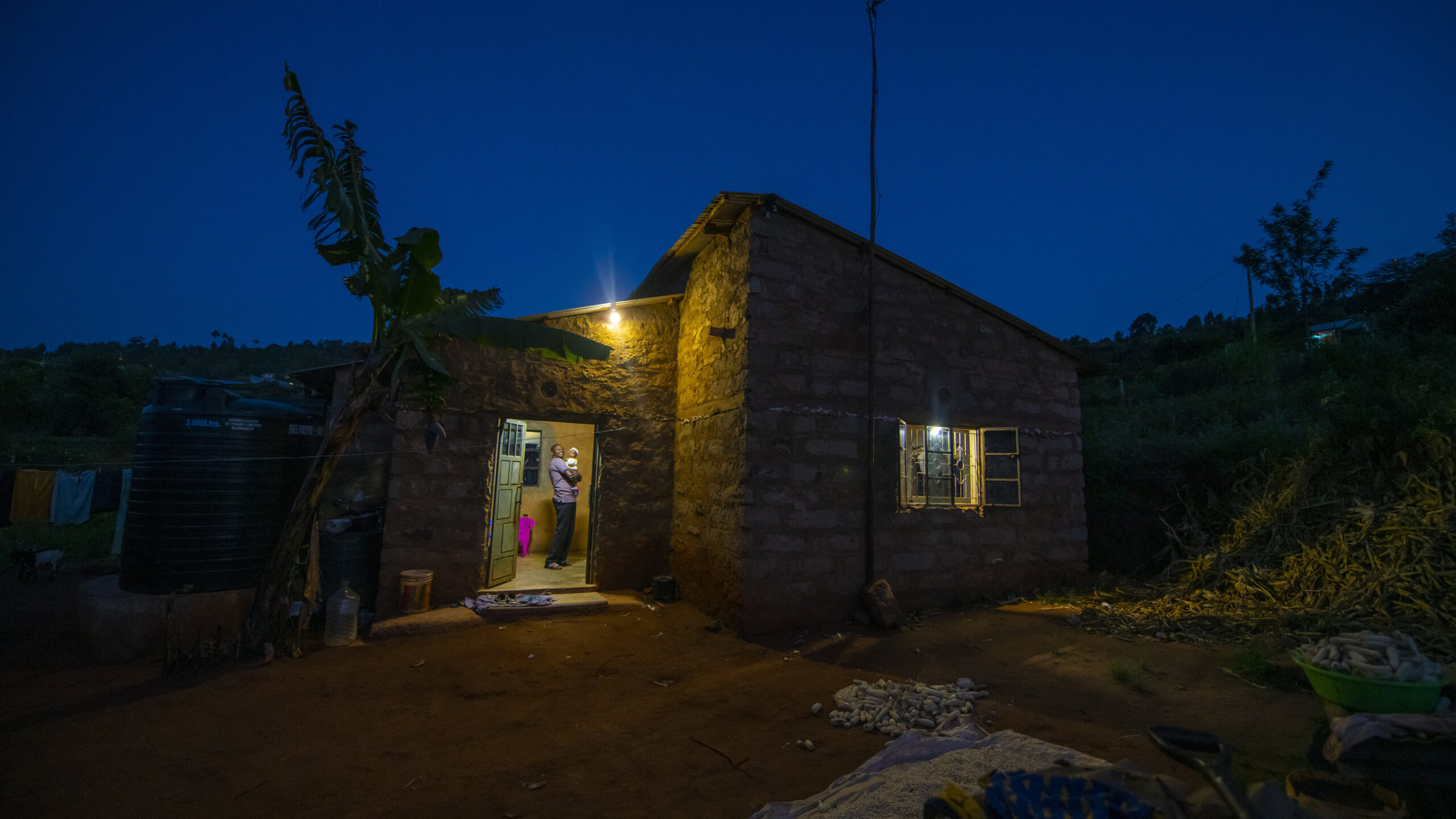
Energy access also enhances business productivity, enables communication and trade, and improves social outcomes (Eberhard & Dyson, 2020). Increased access to electricity is particularly transformative in rural areas, supporting agricultural productivity and better market access (Falchetta, 2021). However, despite global progress, about 750 million people still lack access to electricity, with 80% of this population residing in sub-Saharan Africa (World Energy Outlook, 2024).
Investment context
Kenya exemplifies both the opportunities and challenges of expanding energy access. Although the country has experienced significant macroeconomic growth over the past decade, driven by sectors such as agriculture, manufacturing, and services, approximately 12 million people, primarily in rural areas, still lack access to electricity.
The extension of the national grid to remote areas is often financially unviable due to high costs and sparse populations. Consequently, rural households continue to rely heavily on polluting fuels such as firewood, charcoal, and kerosene, contributing to severe health risks from indoor air pollution.
Off-grid solutions, such as solar home systems, are increasingly critical in bridging the energy gap in these regions. They provide affordable, sustainable electricity access that powers essential appliances, improves household productivity, and enhances the quality of life without the need for expensive grid infrastructure.
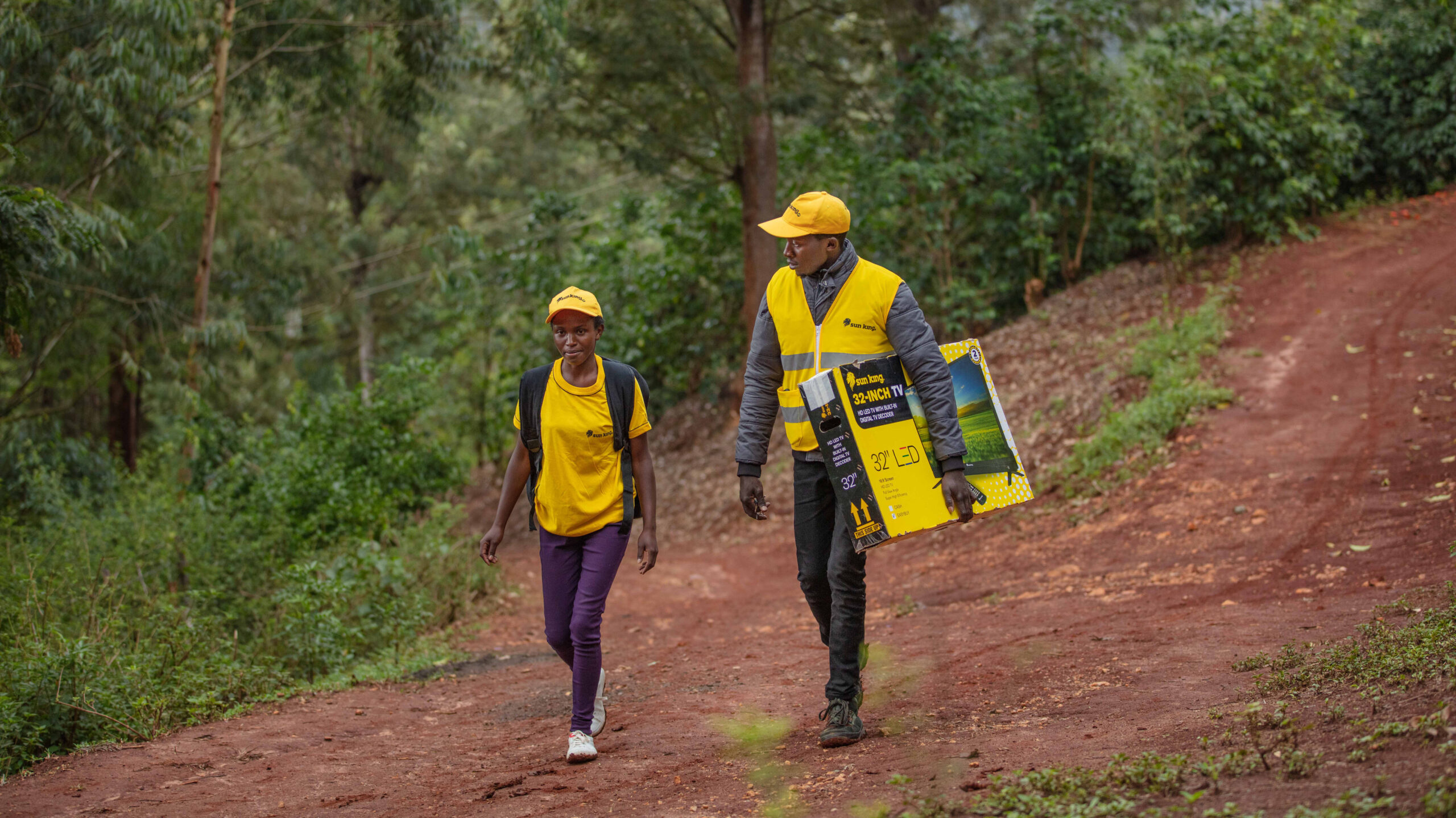
Sun King
Sun King powers millions of Kenyan homes and businesses with solar home systems, lanterns, and inverters, bringing clean energy to communities across the country. In Kenya, a key success factor has been the widespread use of mobile money, which simplifies payments and increases accessibility. Approximately half of Sun King’s registered pay-as-you-go customers in Kenya are women.
PAYGo model driving energy access and financial confidence
In Africa, 350 million adults, mainly women, youth under 25, and informal workers, remain unbanked. Limited access to credit and high upfront costs prevent many low-income households from adopting solar energy, leaving them reliant on expensive, polluting fuels like kerosene and diesel, which consume up to 10% of household income.
Although solar is a cheaper long-term alternative, most households cannot afford to pay the full cost upfront. Traditional lenders often exclude informal workers, and microfinance institutions rarely offer asset financing, leaving a gap that Sun King’s pay-as-you-go (PAYGo) model fills.
PAYGo makes clean energy affordable and accessible by allowing households to pay in small, flexible daily or weekly instalments after a modest down payment. Local agents introduce the systems, and a central credit team assesses eligibility via phone. Once approved, customers activate the product immediately and make payments via mobile money.
If a customer misses payments, the system is temporarily disabled but can be reactivated without penalty when payments resume. Retrieval of the system only occurs after prolonged default. Full ownership of the system by the customer is granted after completing all payments, typically over 6 to 24 months. Customers who can pay in full upfront may do so and own the product from the start.
The model also supports energy access upgrades. Customers who begin with an entry-level system can unlock financing for larger setups, such as more lights, TVs, or AC units, once they demonstrate consistent payment behaviour. This gradual approach helps build creditworthiness and financial confidence.
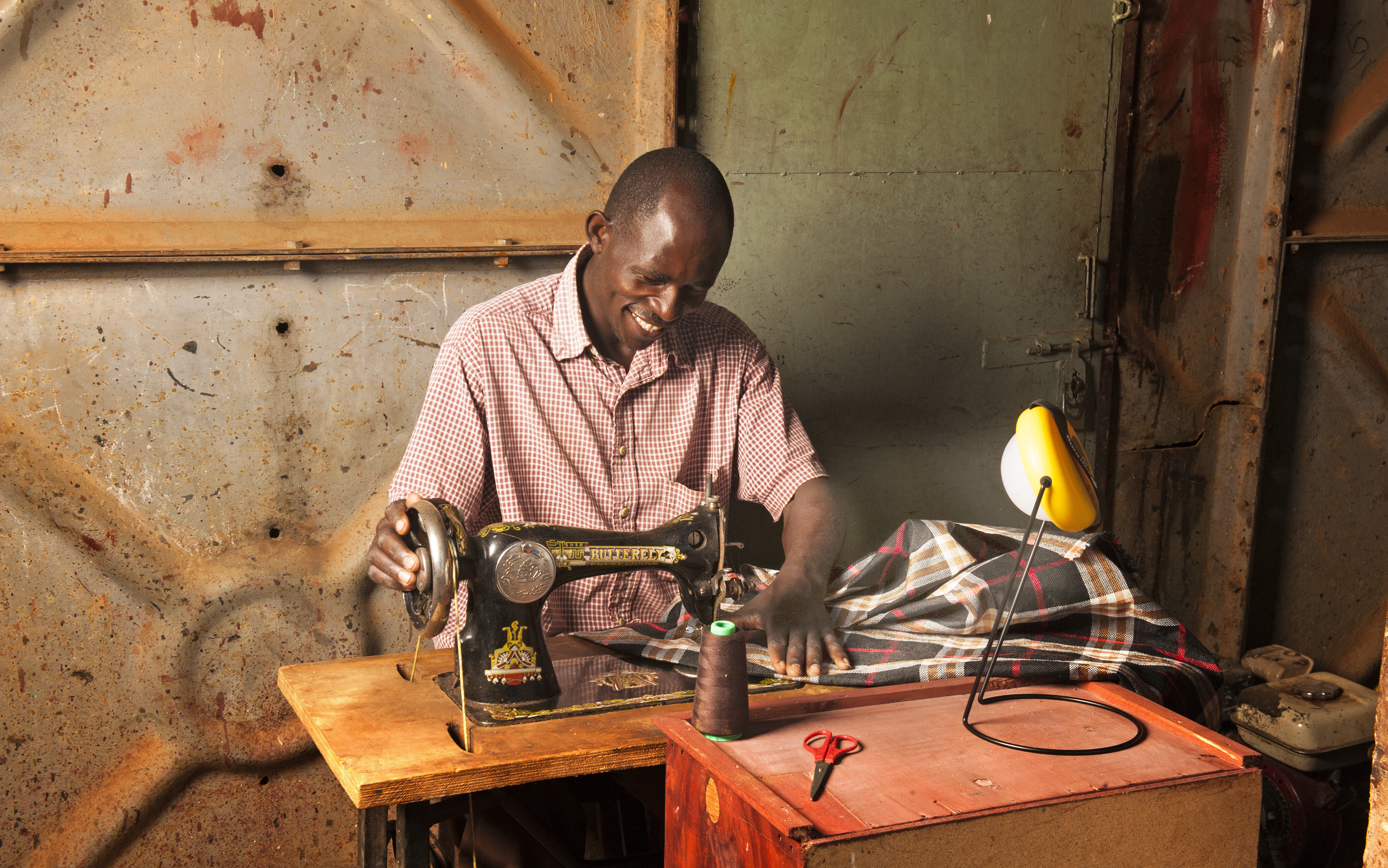
Norfund’s involvement
Norfund has played an active role in financing Sun King through multiple debt facilities at both the group (holding company) level and in Kenya. In 2019, we provided a USD-denominated loan to support the group’s expansion of its product outreach. This loan was refinanced in 2021 into a Kenyan Shilling-denominated debt facility dedicated to Sun King Kenya, aligning financing with the company’s local operations.
In 2023, Norfund participated in a Kenyan Shilling-denominated sustainable securitization transaction for Sun King Kenya. Securitization is a financial process where a company bundles its income-generating assets, such as loans or receivables, and sells them to investors as securities, providing immediate capital while investors earn returns from borrower repayments.
Because Sun King’s customers pay in local currency, the company faces foreign exchange risks, particularly from the depreciation of the Kenyan Shilling against the US dollar. To mitigate this risk, the 2023 transaction was structured entirely in Kenyan Shillings, ensuring both loan disbursements and repayments occur in local currency. The transaction was arranged in collaboration with a lender group including Citi Bank (as arranger), Standard Bank, ABSA, BII, FMO, and the Trade and Development Bank. This financing structure enabled Sun King to free up capital and further expand its product reach in Kenya. Importantly, the participation of Development Finance Institutions (DFIs) with their vast sectoral experience provided comfort to commercial banks to participate in and make the transaction possible. Sun King’s goal is to improve the quality of life for households and create business opportunities across Africa by expanding access to electricity. Norfund’s involvement aligns with our strategy to provide capital to companies delivering off-grid energy solutions to underserved households and businesses.
Additionality assessment
The 2023 debt transaction to Sun King was considered additional in several key respects. Although it involved a partial refinancing of our initial involvement, the investment was financially additional because the company was able to attract commercial lenders into a new industry (off grid solar) and under a new capital structure (securitization) in the local market, on back of the participation from the DFI’s. This challenge stemmed from Kenya’s status as a capital-constrained and higher-risk market for financing. Furthermore, the investment was financially additional because it targeted underserved customer segments and supported a sector with significant development capital needs. Lastly, it helped in deepening the financial markets by encouraging local commercial banks to participate in new capital structures like securitization.
In terms of value additionality, our contribution beyond financing, we were already engaged in a business support initiative aimed at empowering female area business managers and sales agents. Additionally, we imposed enhanced requirements to strengthen Sun King’s environmental and social (E&S) standards and supported its alignment with industry-leading GOGLA Consumer Protection Principles, against which Sun King has successfully undergone a third-party assessment. The 2023 transaction was therefore deemed value-additional through our active role in the investment and our efforts to promote improved social and environmental practices.
Additionality
Additionality is a central part of Norfund’s mandate and informs our investment decisions. The Norfund Act and Norfund Statutes specify that Norfund shall contribute “to establish viable, profitable undertakings that would not otherwise be initiated because of the high risk involved”.
Norfund is financially additional in cases where private sector partners are unable to obtain financing from capital markets for a specific activity at the necessary terms and/or scale, or where we mobilize finance from the private sector that would otherwise not have been invested.
Norfund is value additional when offering non-financial value, e.g. by providing or catalyzing knowledge and expertise, take actions to improve social or environmental standards or fostering good corporate governance.
Risk assessment
During the 2023 due diligence, several risk factors were identified, leading to an overall medium risk rating for the project.
One key risk for Sun King is the potential for customers to default on their payments, which could affect the company’s ability to meet its obligations to lenders. This is a common challenge for businesses that rely on customer payments. However, Sun King mitigates this risk through its network of agents and internal credit assessment process, who conduct assessments at the time of purchase and follow up on payments to ensure better repayment rates.
There are several factors that could contribute to payment defaults. One significant concern is climate change, which could negatively affect household incomes. For example, extreme weather events such as droughts may force households to reprioritize spending, focusing on essential needs like food, which could lead to widespread payment defaults.
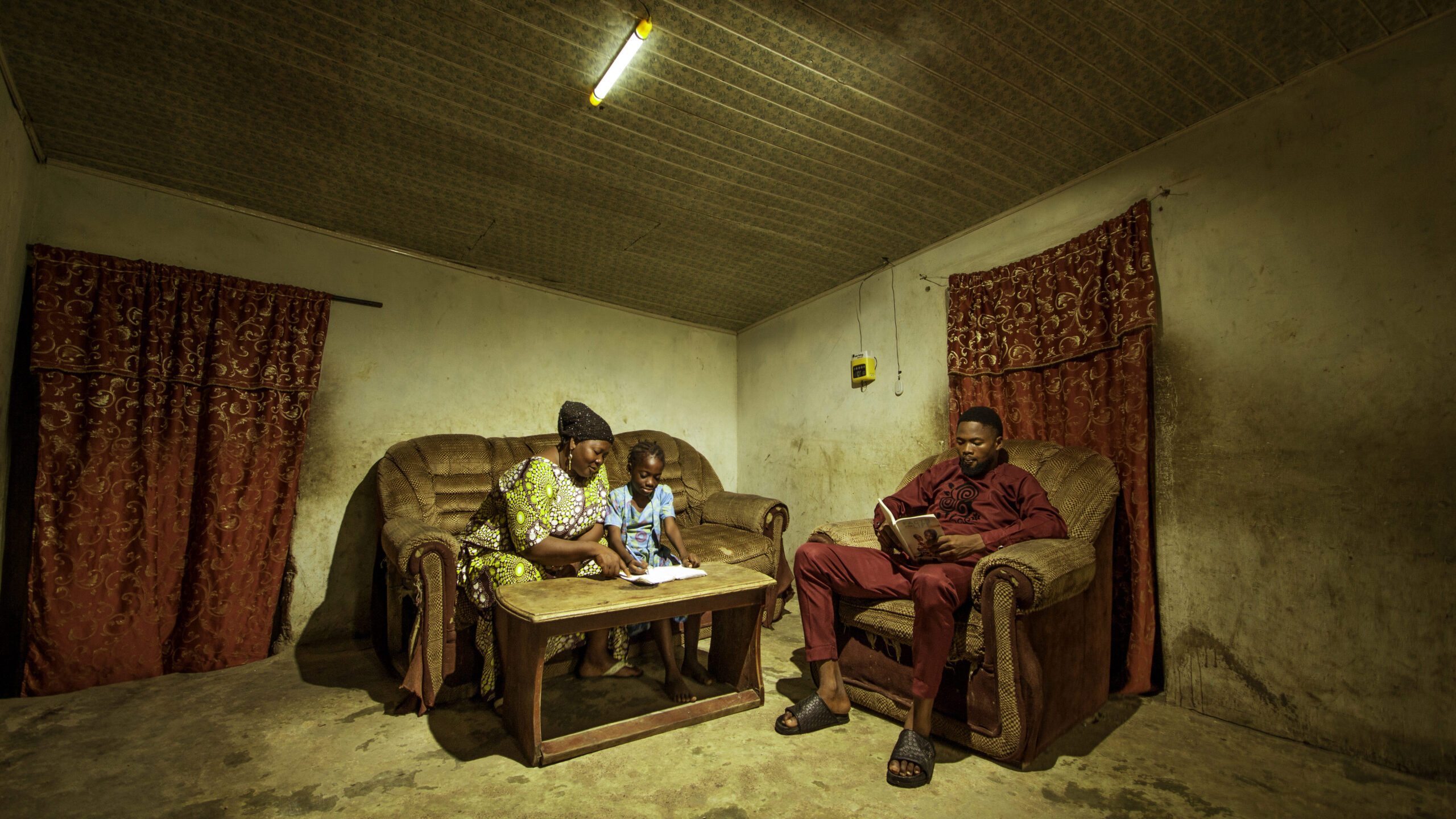
Another substantial risk stems from Sun King’s dependence on foreign exchange in its supply chain. The company imports products while earning revenue in Kenyan Shillings, making it vulnerable to currency depreciation. A decline in the value of the Kenyan Shilling could reduce expected revenues, potentially forcing Sun King Kenya to increase prices on new products, making them less affordable for low-income households. To mitigate this risk, the 2023 debt transaction was structured in local currency, ensuring more predictable repayments for Sun King.
Additionally, as with many projects that involve a large workforce operating remotely, Sun King faces risks related to employee safety and wellbeing. The company employs a significant number of agents who travel extensively, primarily by road, to find new customers and follow up with existing ones. Given this, road safety was identified as a major hazard, requiring further monitoring and mitigation efforts.
Sun King’s contribution to employment
Sun King’s operational structure
Sun King operates through a well-defined structure that ensures efficiency and scalability. The operational structure includes:
Country Managers and Store Employees: Ensure smooth supply chain operations and stock management.
Regional and Zonal Business Managers: Oversee broader regional operations, ensuring alignment with the company’s goals.
Area Business Managers (ABMs): Manage local operations and agent performance.
Agents: Approximately 13,000 agents across Kenya, responsible for direct sales and customer follow-ups.
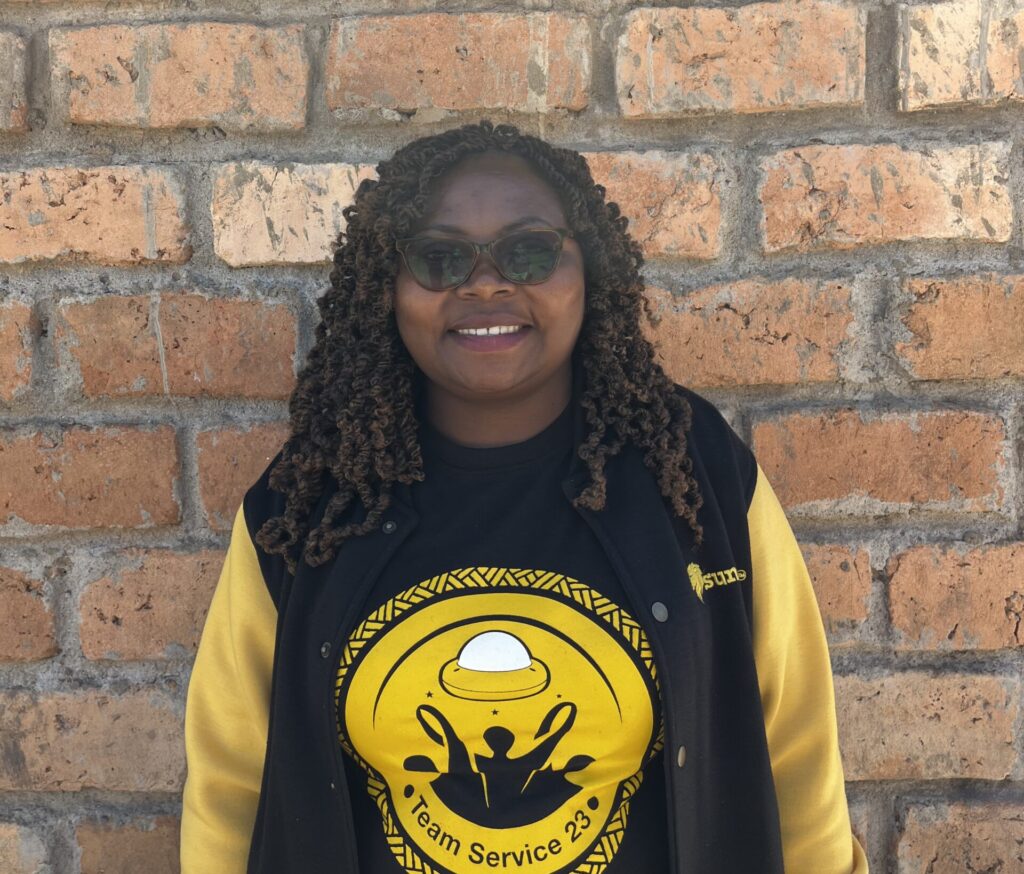
Peninah – Area Business manager for Sun King
Peninah began her career at Sun King as an agent, quickly establishing herself as one of the most valuable in the area within just three months. Her strong performance earned her a promotion to Area Business Manager, where she now oversees 75 agents. She has also enrolled in the company’s health insurance plan and appreciates the opportunities Sun King provide.
The use of agents
The Sun King business model is based heavily on the use of agents, who access local communities to both find and follow up with customers, often in rural areas. Sun King provides meaningful income opportunities for over 30,500 African sales agents, and over 13, 000 of these are contracted in Kenya.
Sales agents visit prospective and existing customers frequently to market Sun King’s products, ensure continuity of payments, support after-sales services and answer relevant questions. Working in their own communities, this network of agents helps keep the revenue they generate in the communities they live and work in.
As part of our investment in Sun King in 2023, one of the loan agreement requirements was for the company to hire a dedicated environmental and social specialist to specifically oversee and improve the welfare of these agents. Following the investment, this specialist was hired and is now actively working on various initiatives to enhance agent welfare.
Sales agents: Key insights
- Through their role, these agents or Energy Officers earn an average of $108 per month from Sun King
- Roughly half of all Energy Officers possess a primary education or less
- Though solar and sales roles are often viewed as male jobs in these communities, 46% of Sun King Energy Officers are women
Sun King’s agents operate on a commission-based payment structure. The commission-based structure allows the agents the flexibility to work when they wish, to combine it with other employment and to easily resign if given other employment opportunities. This flexibility allows many individuals who wouldn’t otherwise be able to take on a full-time job, for cultural, family, or other reasons, to access meaningful income-generating opportunities. On the flip side, the commission-based structure allows less predictability of income than a permanent employment contract would allow.
This flexibility is important for Sun King, as payments to agents naturally go down when sales volumes decrease. Even if the agents are not included in the standard benefit schemes Sun King has taken significant steps to improve their safety and working conditions. As agents frequently travel as part of their job, road safety, risk assessments, mitigation plans and emergency support have been key concerns for the company.
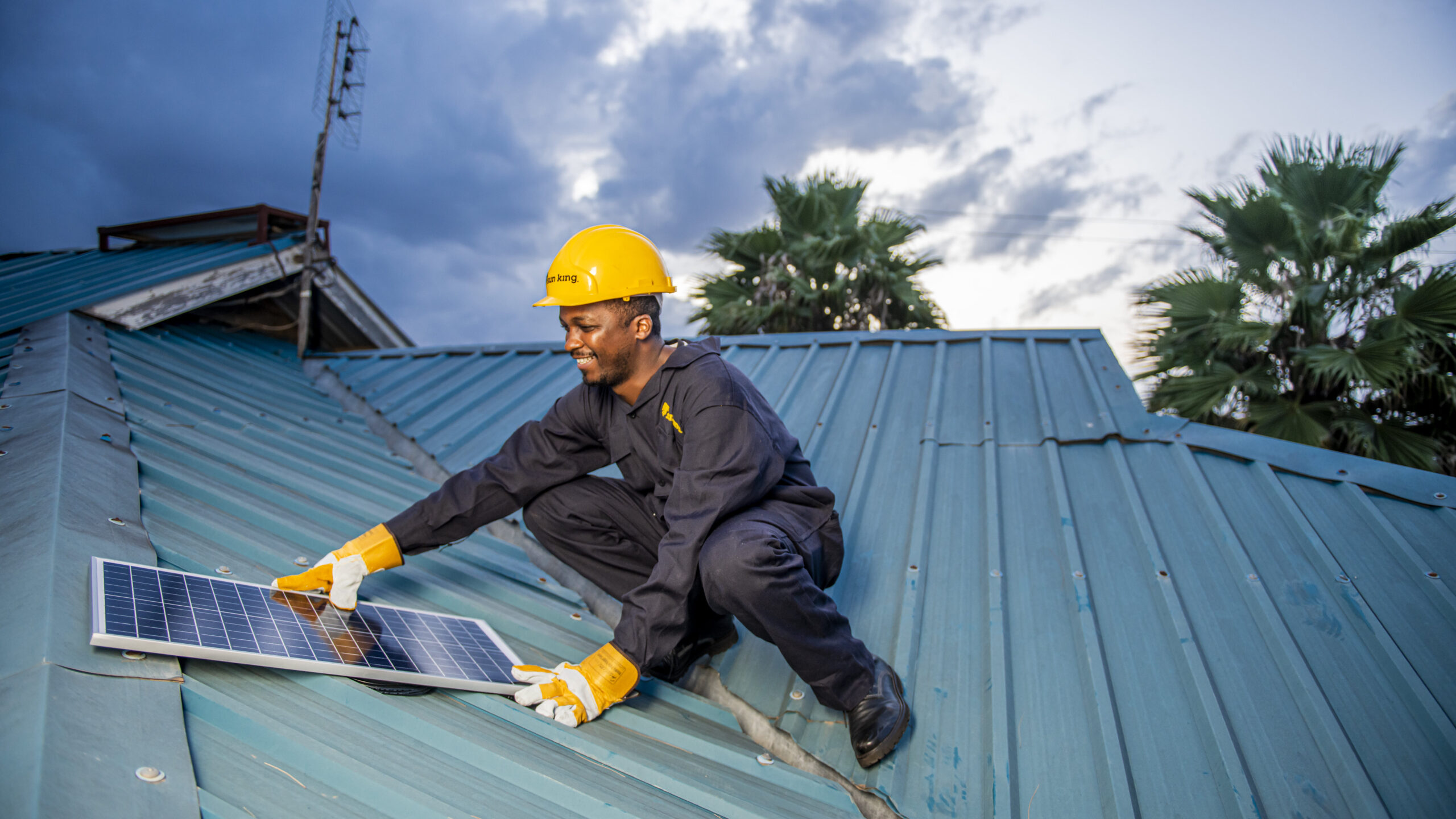
To address health-related risks, Sun King introduced a health insurance scheme, with the cost deducted from agents’ earnings. However, as participation in the scheme is voluntary, only a minority of agents have opted in. Although some agents have their own insurance plans, Sun King has provided training and informational sessions to raise awareness of the benefits of health coverage, to encourage greater enrollment in their scheme.
In addition to health insurance, Sun King has implemented an app-based service that allows agents to quickly report any issues encountered in the field. The system provides real-time location tracking, enabling the office team to respond quickly in case of emergencies.
Further efforts to improve agent safety focus on their work installing solar home systems. Sun King has taken measures to ensure agents have the necessary protective clothing and equipment, particularly when working at heights, such as installing solar panels on rooftops. These initiatives collectively aim to enhance the safety, predictability, and overall well-being of Sun King’s agent workforce.
Use of Norfund’s business support facility
In 2022, Sun King launched an internal initiative called Equal Voices to improve gender balance across the organization, with a particular focus on sales teams and managerial roles. The program was designed to support two key segments of female employees: (1) to foster peer networks and build the confidence of female area business managers, and (2) to upskill and mentor high-performing women in junior sales roles with leadership potential.
To support the rollout and impact of Equal Voices, Sun King partnered with Norfund through its Business Support facility. This collaboration enabled the company to deliver a structured series of workshops and mentoring sessions for women employees across its sales operations.
“Equal voices has helped me in many ways in building my career and helping me overcome my fears,”
Participant in equal voices program
The results were highly positive. Participants reported increased confidence in their roles and greater comfort engaging with senior leadership. This, in turn, enhanced their performance and contribution at work. Given the program’s success, Sun King is now in the process of making Equal Voices a permanent fixture within its employee development strategy alongside ensuring the necessary safeguards to ensure gender protection.
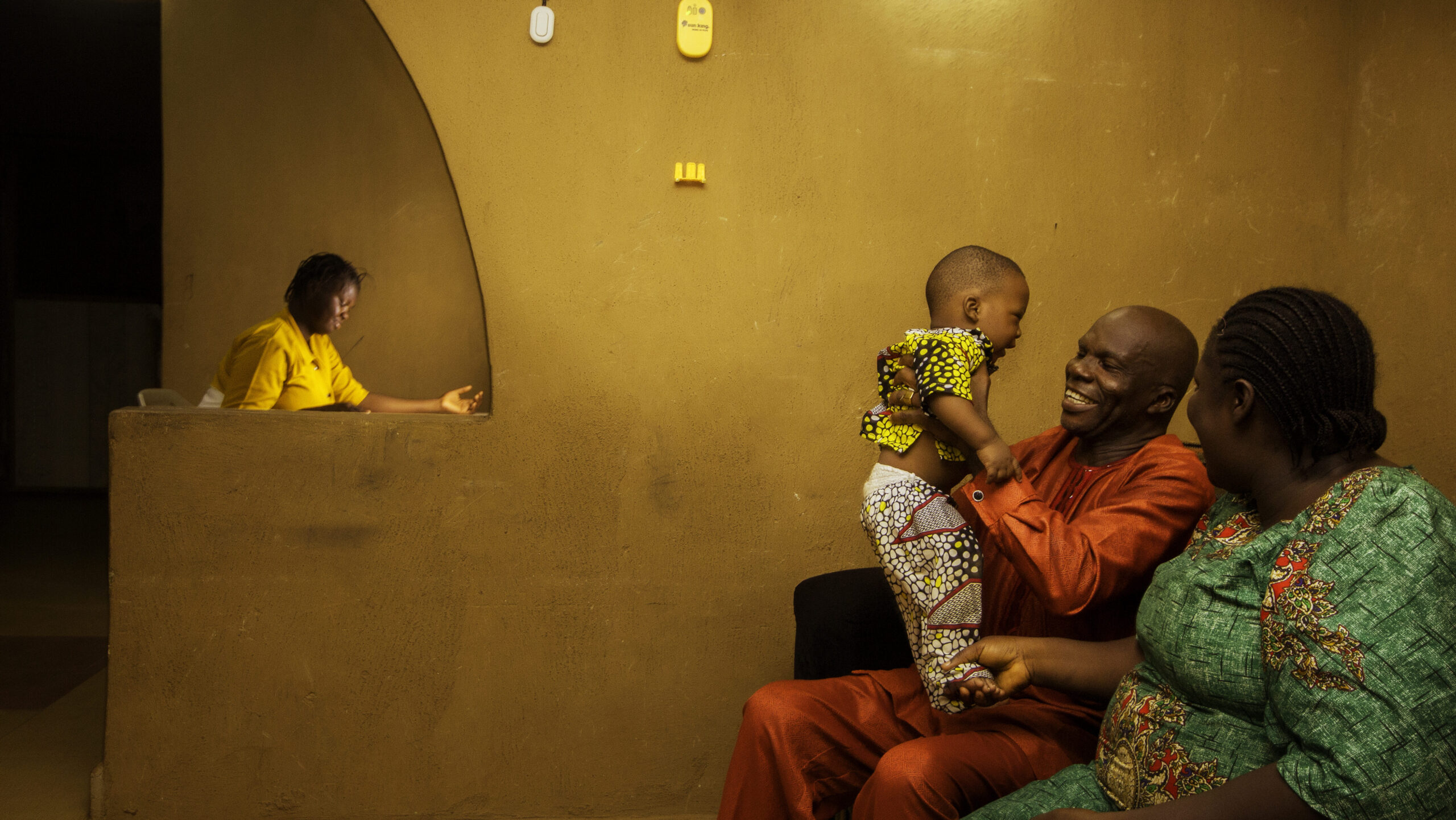
Customer stories
To observe the effect of increased access to off-grid energy solutions, visits to households and businesses who purchased Sun Kings´ products were conducted by two Norfund staff in 2024. The visits were facilitated through collaboration with Sun Kings employees and their access to customers.
Impact on households
Household visits provided valuable insights into the tangible impact of off-grid solar products on daily life. Several families highlighted the ability to perform tasks more efficiently and enjoy greater flexibility within their homes, such as being able to occupy separate rooms after dark, something that was previously challenging due to limited lighting.
Before adopting solar-powered solutions, most of the visited households relied on kerosene lamps, which not only posed health and safety risks due to indoor air pollution and fire hazards but were also costly to operate. As a result, families often restricted their use, limiting their access to lighting.
By replacing kerosene lamps with solar-powered alternatives, the households have significantly improved their access to electricity. Several parents emphasized how this transition has positively impacted their children’s ability to study in the evenings, ultimately supporting better educational outcomes. Additionally, the shift to cleaner and more affordable energy has enhanced overall quality of life, making their homes safer, healthier, and more functional.
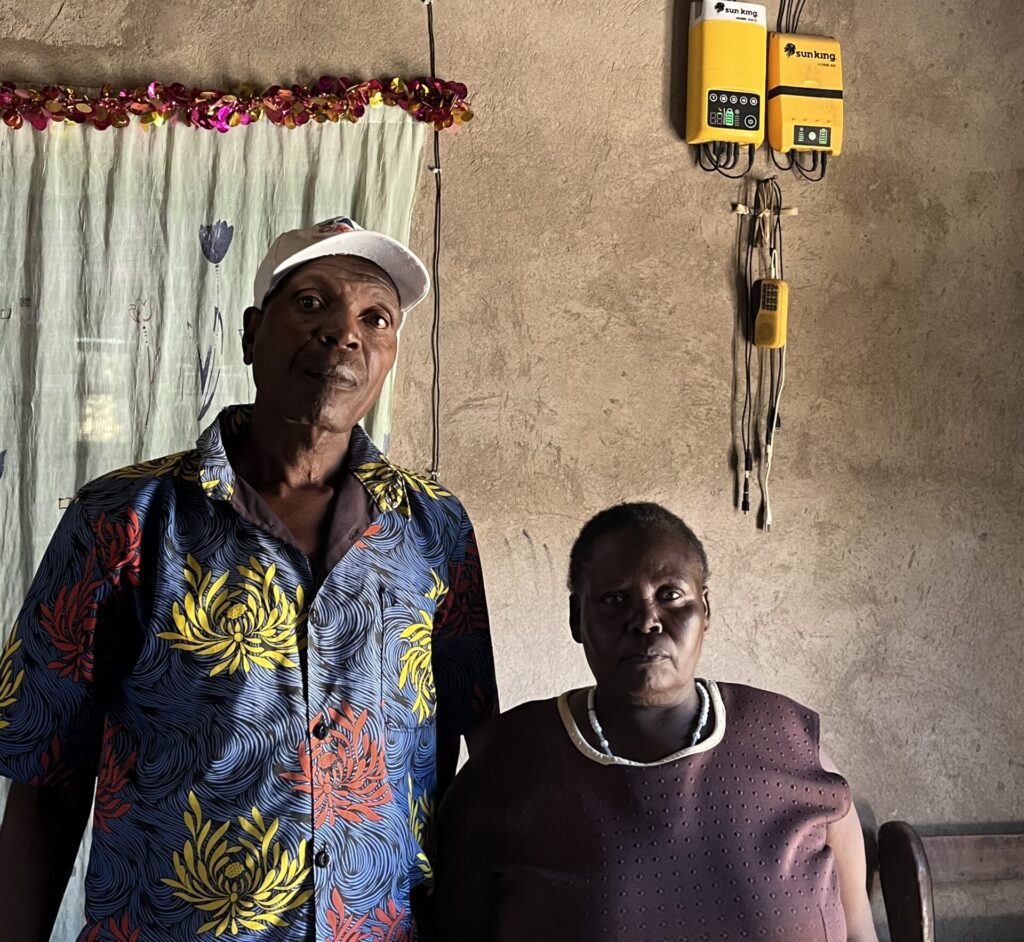
Phyiles
Phyiles lives in rural Kenya, with six children and her husband. Phyiles reported significant improvements in the families’ daily lives after adopting a solar home system from Sun King. With access to multiple solar-powered lamps, their household has experienced greater convenience and flexibility in their evening activities.
One of their children, who recently entered secondary school, has particularly benefited from the extended study hours made possible by reliable lighting. Previously constrained by limited access to light, the family now enjoys improved quality time together, no longer restricted by the need to gather around a single source of light. The parents highlight that the transition to solar energy has not only enhanced their productivity but also improved their overall home environment, fostering a more comfortable family life, where it is easier to be together as a family.
Gladys
Gladys’s household, made up of six members, previously depended on a single kerosene lamp for all activities after dark. This limitation not only made household chores more challenging but also restricted the family’s ability to use different rooms in the home.
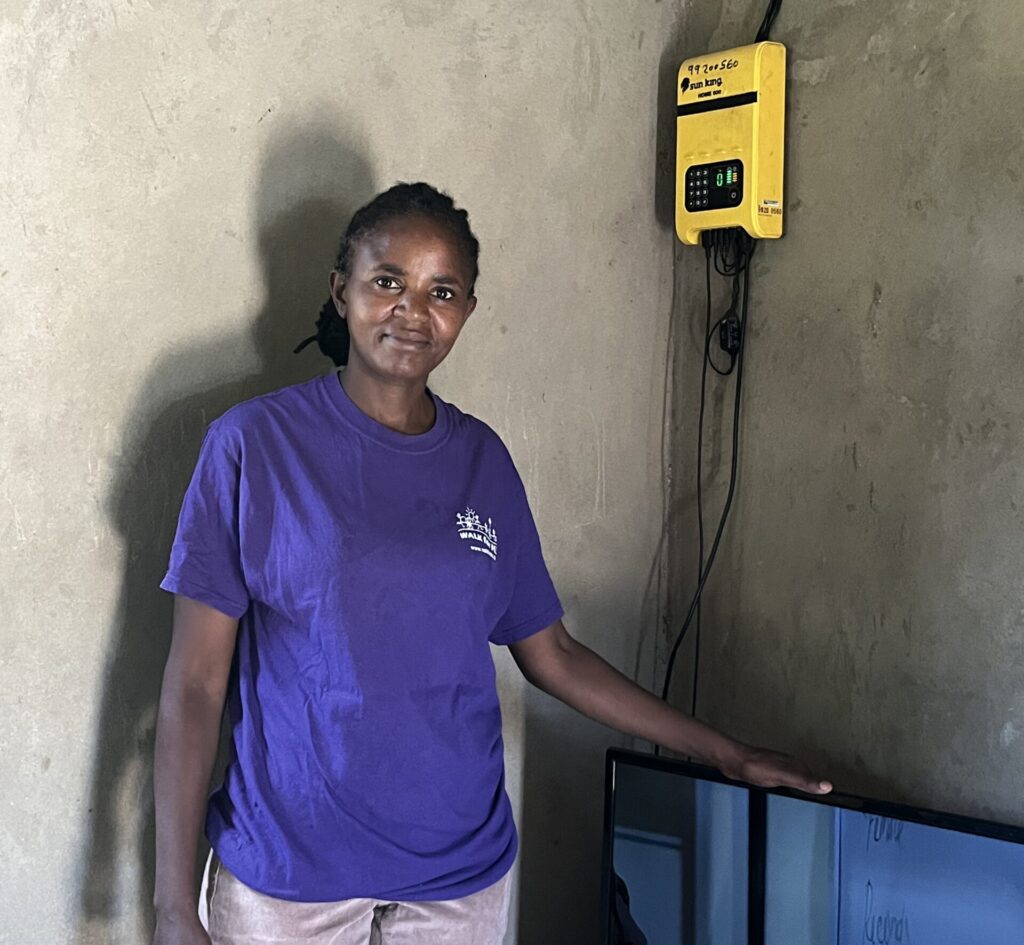
With the installation of Sun King’s solar system, the family now benefits from multiple light sources, greatly enhancing their daily routines. The children can study for longer hours, improving their academic performance, while the family enjoys greater flexibility in their homes, as they now can use multiple rooms at the same time. In addition to the tube lights , Gladys had also purchased a TV from Sun King. This enables the household to stay informed and entertained through television programs, which she testifies enriches their quality of life.
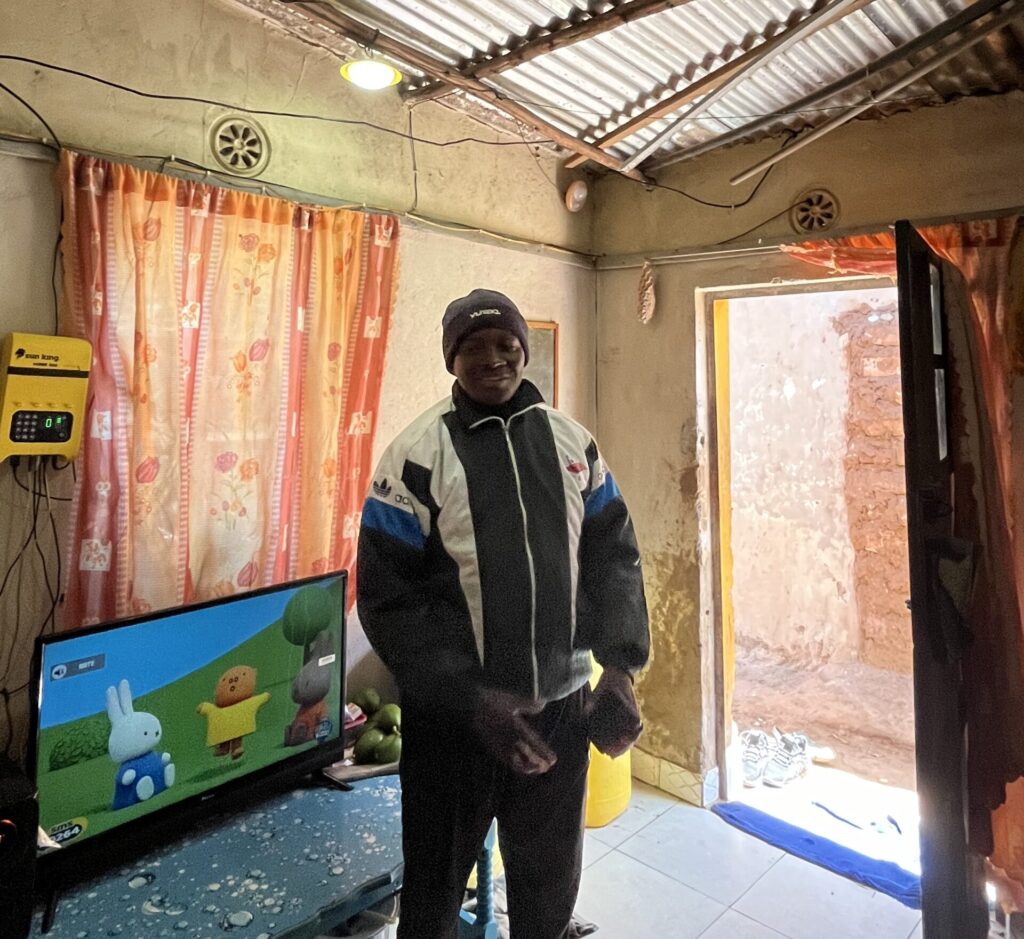
Francis
Francis, a father of a toddler, has experienced an improvement in the daily lives of the family after switching to Sun King’s solar system with six tube lights, replacing their unreliable car battery-powered light they previously used.
The family has invested in both the light bulb system and a sun powered TV system. With consistent and reliable lighting and the entertainment from the TV, the mother in the family highlights the benefit of being able to complete household chores without interruptions, while the child remains engaged and entertained by the television. This shift frees up time for the mother, that is now able to perform tasks simultaneously as taking care of the child.
A common experience among all the households visited was their previous reliance on costly and pollutive energy solutions. Each household now enjoys significantly greater access to reliable lighting and entertainment, allowing them to use their homes in a new way.
Additionally, Sun King’s pay-as-you-go model allows the families to make small, manageable payments over time, ultimately leading to full ownership of the solar home system. Several customers emphasized that this financing approach not only made solar energy more accessible but also boosted their confidence. The ability to gradually invest in and expand their energy system has empowered them, reinforcing their belief that they can continue improving their homes and quality of life over time.
Sun King tracks household outcomes resulting from its products. According to the company, its offerings contribute to the following household impacts across all regions in which it operates.
report improved quality of life, citing lower energy costs, more study time, and longer hours of work made possible
households provided with access to electricity
report improved health outcomes after switching from kerosene lamps
saved by households in energy costs by replacing kerosene lamps and candles
Impact on businesses
Many businesses have adopted Sun King’s products to secure reliable electricity access and mitigate the negative effects of power outages. A recent Sun King study, based on self-reported data from their clients, shows that about 12 % of their customers use their products for productive use. By ensuring uninterrupted operations, these solar solutions contribute to increased productivity and higher revenues. Over time, this enhanced business stability is expected to drive growth, leading to expanded operations and the creation of new employment opportunities.
Local bar
A small bar in Machakos, which previously relied on candles for lighting, recently transitioned to Sun King’s solar lighting system. This shift has eliminated safety hazards from dangerous and pollutive use of candles, reduced operating costs, and enabled the bar to extend its business hours, attracting more customers.
Since the installation of Sun King’s products, the bar’s employe has observed a noticeable increase in sales. If this positive trend continues, the business may soon need to hire an additional employee, highlighting the potential for solar energy to drive both business growth and job creation.
Development effects and theory of change
Since the start, Sun King Kenya has provided services to millions of households. In 2023 alone they provided over a million new products to customers in Kenya. Of this, over 220 000 were new solar home systems to households that had previously not had such access, and 870 000 units were other accessories such as lanterns and solar-powered fans.
Norfund has theories of change for each of its investment areas, describing how our inputs are expected to lead to certain outputs, outcomes and in the end a desired set of impact goals. The theory of change is a comprehensive framework that outlines how and why a desired change is expected to happen in a particular context. The input is what Norfund provides as an investor, while the output is monitored during annual reporting. The outcomes are generally measured through case studies and other in-depth analysis on a case-to-case basis. The expected long-term outcomes and impacts are demonstrated through literature. In the below figure, the elements that are particularly relevant to Sun King are highlighted in red.
Norfund’s theory of change for Renewable Energy investments under the Development Mandate1
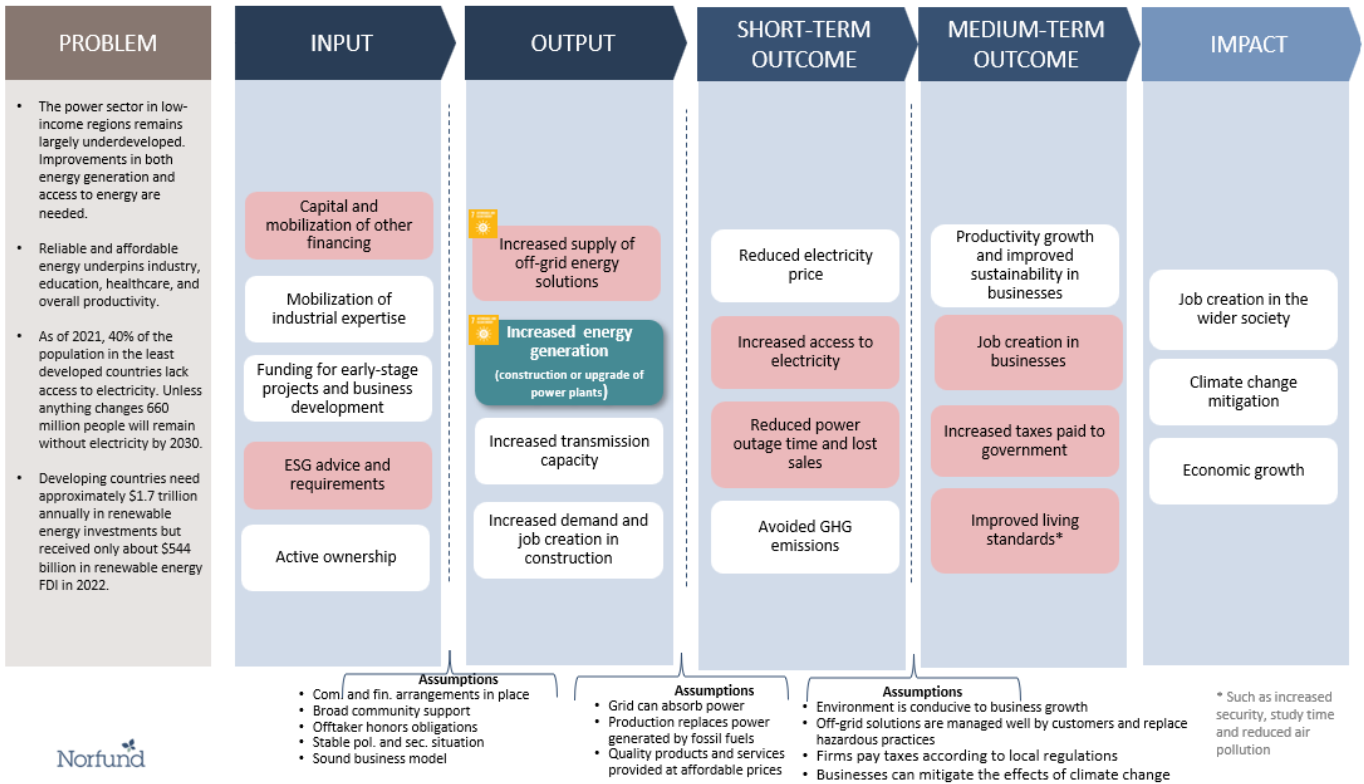
The expansion of off-grid energy solutions is expected to bring multiple benefits, including greater electricity access, reduced power outages, improved living standards, job creation, and increased tax revenues for the government. As part of our household and business visits to Sun King’s customers, we were able to observe some of these anticipated outcomes.
All three households we visited had purchased Sun King’s products and reported significantly improved access to electricity. This, in turn, has enhanced their quality of life in several ways, such as enabling children to study for longer hours, reducing reliance on costly and hazardous alternative energy sources, and improving overall household convenience.
The business we visited also demonstrated notable benefits from off-grid energy access. With more reliable electricity, the business was able to extend its operating hours, leading to increased sales and higher profitability. This expansion underscores how improved energy access can directly contribute to economic growth at the micro-level.
While visits to the households and the business did not provide direct evidence of increased tax contributions or job creation within the small, observed sample, it is anticipated, based on literature and experiences, that these benefits will materialize over time. Reliable electricity fosters productivity growth by reducing costs related to power outages and costly backup solutions, enabling businesses to scale, facilitating job creation. Additionally, access to electricity enhances educational outcomes by allowing students to study for extended periods, ultimately contributing to a more skilled workforce in the long run.
While the immediate effects of off-grid energy access are clear in terms of improved electricity availability and business performance, its broader economic impact, such as increased employment and tax contributions, is likely to emerge in the longer run.
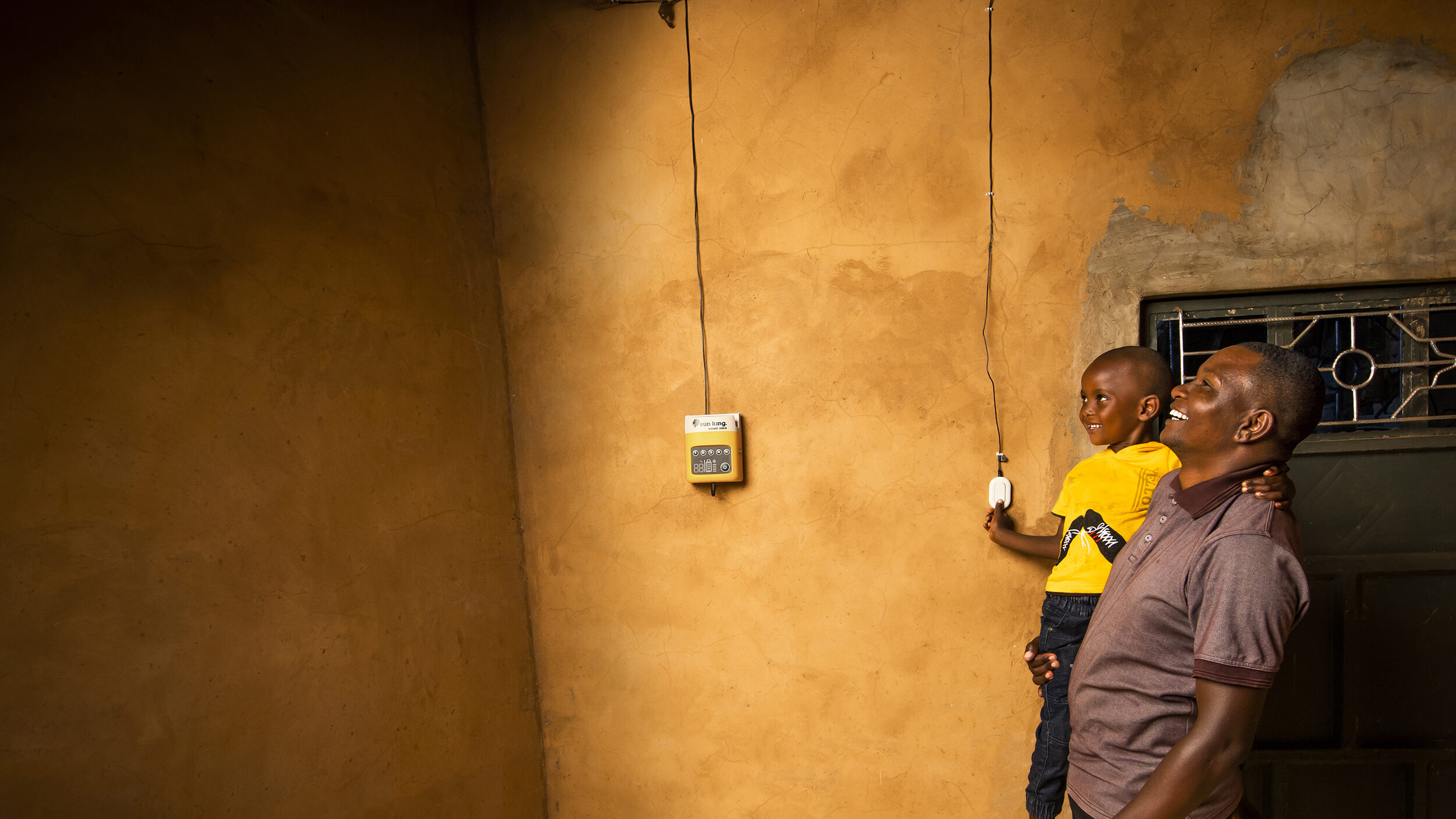
Conclusion and next steps for Sun King
Since its establishment, Sun King has demonstrated a strong ability to adapt its business model to changing conditions and the diverse needs of different countries. The company has expanded its reach, bringing electricity to more remote areas, and diversified its product offerings to include solar lanterns, entry-level solar home systems, solar systems with TVs, mobile phones, and solar-powered AC systems. This growth has been underpinned by a focus on market trends, competitor analysis, and extensive product piloting, which ensure financial predictability while maintaining affordability for customers.
Sun King’s operations in Kenya illustrate the transformative potential of sustainable energy solutions. With support from Norfund, Sun King has expanded its reach, improved the quality of life for millions of households and businesses, and fostered economic development. The positive impacts observed during our visits underscore the importance of continued support for such initiatives to ensure long-term prosperity and environmental sustainability for Kenyan communities.
Looking ahead, Sun King aims to replicate its success in Kenya across multiple other countries. To achieve this, it will be crucial to maintain access to local currency financing, enabling continued expansion and predictable repayment schemes. Ongoing adaptability, strong market analysis, and customer-centered innovation will remain essential as Sun King pursues its broader mission of delivering affordable solar energy solutions to underserved populations.
